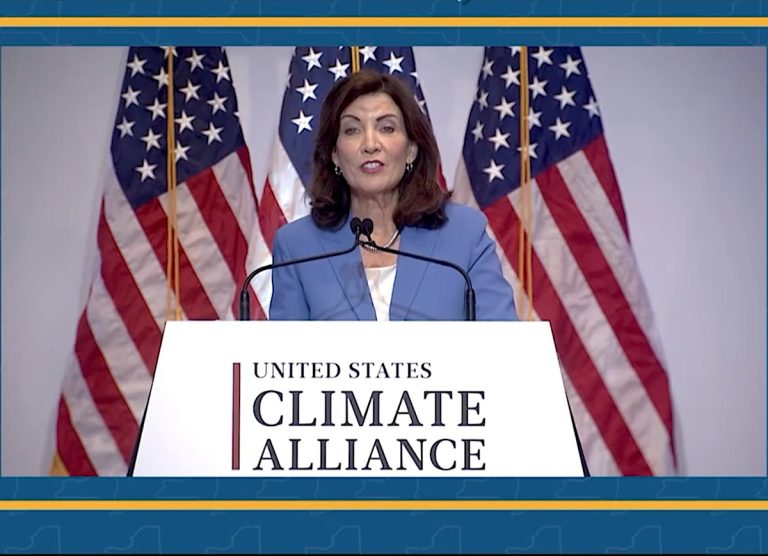
Hydraulic fracturing, commonly known as fracking, has turned the United States into the Saudi Arabia of natural gas, but not New York, where idiot politicians like Governor Hochul stubbornly refuse to exploit the vast wealth beneath our feet. [emphasis, links added]
Two huge shale formations lie beneath much of northeastern North America.
The relatively shallow Marcellus Shale extends from West Virginia into southern New York state.
The Utica Shale, which lies beneath the Marcellus River and may contain more natural gas, extends further northwest into Canada and east into Albany, a large swath of the Empire State.
Together, the two formations are estimated to contain at least 500 to 1,000 trillion cubic feet (Tcf) of natural gas distributed throughout their extent.
While it's difficult to determine exactly how much natural gas is within New York's borders, a study by the New York Energy Research and Development Authority estimated the amount to be between 160 and 300 Tcf — At current consumption rates, that would be enough to meet the state's total natural gas needs for 300 years.
At today’s market value, New York's reserves could be worth as much as $1 trillion.
Yet instead of capitalizing on the economic benefits of the measure, the state allowed environmental hysteria to devastate its nascent fracking industry, beginning with Gov. David Patterson’s moratorium in 2008.
Gov. Andrew Cuomo signed legislation outright banning fracking in 2014, and he effectively banned new natural gas pipelines that would carry low-cost natural gas from Pennsylvania to New York.
Last month, Hochul went on to sign legislation banning the use of carbon dioxide instead of water for fracking.
“We're not going to fracking… We're not going backwards,” she said in September.
Fracking is an extraction method that injects high-pressure liquid or gas into cracks in underground rock to release energy.
Environmental fanatics cite a variety of reasons to oppose it, from cancer concerns to water contamination concerns to the now-thoroughly debunked story of faucets on fire.
They succeeded in suppressing the industry in New York state—even in the face of huge gains in neighboring Pennsylvania.
Fracking has generated billions of dollars in economic benefits for the Keystone State.
Impact fees collected from drillers have generated more than $2.7 billion in revenue for rural Pennsylvania communities since 2012 — money that these formerly struggling towns and counties invest in new schools, housing and economic development.
To his credit, Pennsylvania Governor Josh Shapiro has resisted continued efforts by environmentalists to ban fracking in the state.
In 2023, the average retail electricity price in New York will be 50% higher than in Pennsylvania.
Pennsylvania’s natural gas industry supports hundreds of thousands of jobs: According to a 2023 study, drilling companies provide more than 100,000 direct jobs, and hundreds of thousands more indirect jobs, namely those created by fracking companies Employment opportunities provided by expenditures on goods, services and workers' wages.
Fracking jobs pay well.
A study from the U.S. Bureau of Labor Statistics estimated that the average salary in 2017 was nearly $150,000 in today's dollars.
Fracking in Pennsylvania has lowered the price of energy for state residents by dramatically increasing the production of natural gas — the natural gas used to heat and generate electricity, much of which is produced using natural gas.
In 2023, the average retail electricity price in New York will be 50% higher than in Pennsylvania.
If New York could produce half As with natural gas in Pennsylvania, statistics show that more than 50,000 direct jobs could be created, with many more indirect jobs.
It also represents a tax bonanza that provides hundreds of millions of dollars in new revenue for Albany, in addition to more than $100 million in annual impact fees to the local community.
U.S. Department of Energy 2021 Research Findings A nationwide fracking ban would result in soaring energy prices, millions of job losses, and nearly $1 trillion in lost wage income.
It would also have national security implications, making the United States dependent on expensive foreign sources of natural gas.
Like all energy sources, fracking is not primitive for the environment.
But it turns out the benefits are huge, even beyond jobs and income: Lower energy prices are a huge economic boon, making almost everything else more expensive, and natural gas power plants have largely replaced Dirty power plants run on coal, reducing pollution and carbon emissions.
Yet opponents of fracking rarely acknowledge these economic and environmental positives.
New York’s pursuit of green energy and environmental hysteria have lost any concern for the economic well-being of its citizens, especially those upstate whose communities have endured decades of economic decline.
Over the years, fracking has provided the opportunity to reverse this trend by creating thousands of new jobs, as it has done in Pennsylvania.
Still, New York Democrats, led by Hochul, chose to squander the opportunity.
Fracking alone will not solve New York’s economic problems, given the state’s rigid regulations, high taxes, general hostility to business, and unrealistic green energy goals.
But reversing the fracking ban is a good place to start.
To read more, visit the New York Post
